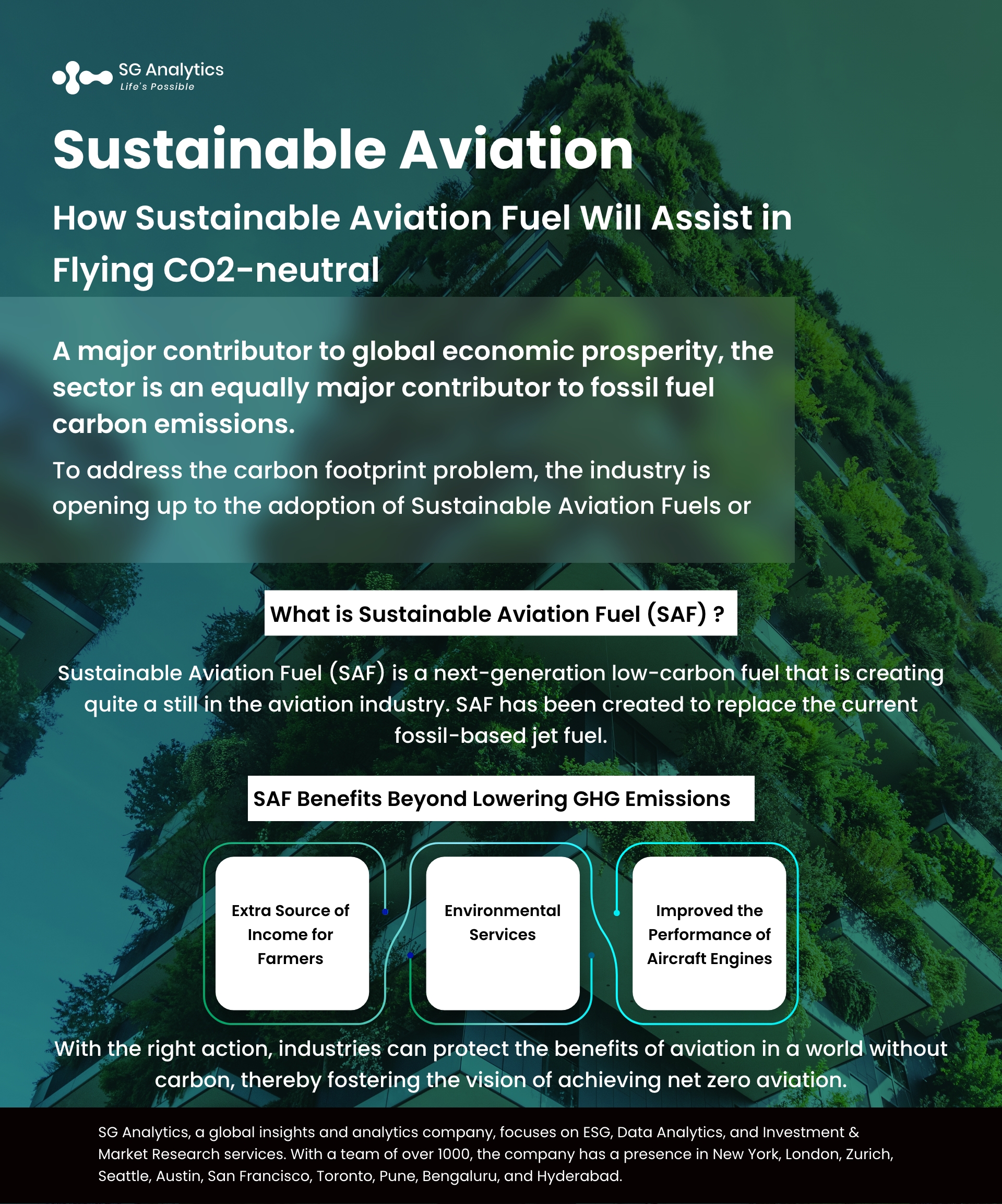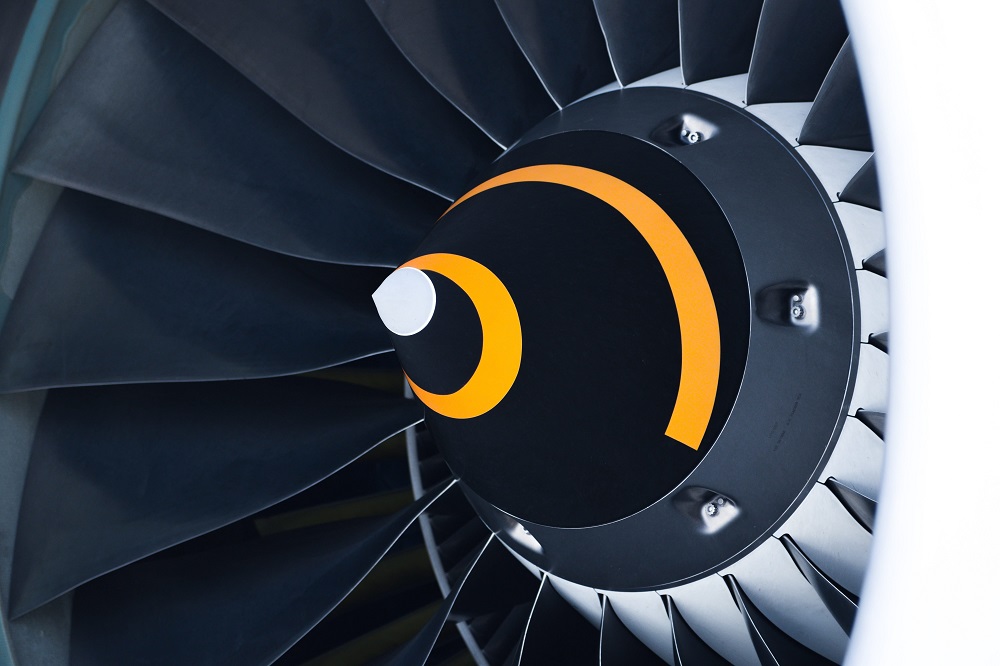Every industry is trying to find a solution to tackle the rising climate change crisis. And aviation is no exception. Considered a major contributor to global economic prosperity by unlocking trade, investment, and understanding between cultures, the sector is an equally major contributor to fossil fuel carbon emissions. The industry is exploring new avenues to remove carbon from flying, and it is their most important ambition in both the short and long term.
To address the carbon footprint problem, the industry is opening to the adoption of Sustainable Aviation Fuels or SAF. Sustainable Aviation Fuel (SAF) is being considered the only option for long-haul flights to decarbonize. Long-haul flights are accountable for almost 70% of global aviation emissions. Hence there is a dire need to scale up production while driving down costs.
The rise of sustainable aviation fuels is emerging as the new bridge to a zero-emissions future. By reducing emissions and chartering more fuel-efficient private jets, the aviation industry is joining hands to integrate SAF as a replacement for fossil fuel, thus offering a clear path to achieve net zero. Forward-thinking organizations are also joining forces with leading producers of renewable diesel and sustainable aviation fuel to support the use of SFA in aviation.
Read more: Inflation Reduction Act Likely to Boost US EV Industry

But what exactly is Sustainable Aviation Fuel?
How is it generated, and how does it benefit the environment?
Let's gain an in-depth understanding of Sustainable Aviation Fuel (SAF) for carbon footprint reduction in the aviation sector.
What is Sustainable Aviation Fuel (SAF)?
Sustainable Aviation Fuel (SAF) is a next-generation low-carbon fuel that is creating quite a still in the aviation industry. SAF has been created to replace the current fossil-based jet fuel. Designed from 100% renewable waste as well as residue raw materials, SAF is a form of developing technologies that are assisting the aviation sector in reducing their carbon emission. A liquid fuel used in commercial aviation, SAF helps in reducing CO2 emissions by up to 80%. For distribution in aircraft, SAF is blended with fossil jet fuel to meet the jet fuel specifications. SAF can be produced synthetically via a process that helps in capturing carbon directly from the air. It is sustainable due to the use of raw feedstock used during generation. While fossil fuels add to the generation of the overall level of CO2, SAF helps in recycling the CO2 that has been absorbed by the biomass during its life.
Is Sustainable Aviation Fuel (SAF) beneficial?
Over the entire lifecycle, SAF is estimated to help reduce greenhouse gas (GHG) emissions by up to 80% when compared to fossil jet fuel. In addition, SAF is also significantly important in lowering the non-CO2 effects compared to fossil jet fuel. The aviation industry is eying SAF as a sustainably sourced material that is helping them with long-term net zero along with promoting the awareness and adoption of waste-to-fuel solutions. Global corporations are offering their flyers the opportunity to offset their regular fuel.

Read more: Sustainability Outlook: Is ESG an Investment Strategy or a Path to Creating a Sustainable World?
Sustainable Aviation Fuel (SAF): Reliable and Low Carbon
A biofuel used to power aircraft, SAF has similar properties to conventional jet fuel but a smaller carbon footprint. Sustainable Aviation Fuel (SAF) is generated from renewable biomass and waste resources and holds the potential to present the performance of petroleum-based jet fuel. Based on the feedstock and technologies used for the generation, SAF helps in reducing life cycle GHG emissions dramatically. Some of the emerging SAF pathways have a net negative GHG footprint.
It has a lower carbon intensity, making it an important solution to reduce aviation GHGs. With a fraction of its carbon footprint, SAF offers airlines solid footing to decouple their greenhouse gas (GHG) emissions from flights.
SAF Benefits Beyond Lowering GHG Emissions
With the rise in sourcing and producing SAF from renewable and waste resources, new economic opportunities are also being created in other sectors, thereby improving the environment and boosting aircraft performance.
-
Extra Source of Income for Farmers
By cultivating biomass crops for SAF production, farmers can earn more during off-seasons by providing feedstock to this new market. It is also enabling them to secure benefits for their farms, including reducing nutrient losses and improving soil quality.

-
Environmental Services
Biomass crops help in controlling erosion and enhancing water quality and quantity. They help boost biodiversity and store carbon in the soil, which further helps in delivering on-farm benefits as well as environmental benefits. Producing SAF from wet wastes also aids in reducing pollution pressure on watersheds while keeping potent methane gas out of the atmosphere.
-
Improved the Performance of Aircraft Engines
SAF contains fewer aromatic components enabling it to burn cleaner in aircraft engines. This aids in lowering local emissions of harmful compounds during take-off and landing.
Read more: Sustainability Data Strategy: Top Key Components for a Positive Impact
Sustainable Aviation Fuel (SAF): The Future of Aviation
The International Air Transport Association (IATA) has recognized SAF as one of the biggest contributors to the aviation industry's 2050 Net Zero Carbon Emissions Commitment. They are now predicting that around 65% of projected future carbon reductions will be from SAF consumption (compared to 19% for carbon offsetting/capture. However, to hit this goal, they need to roll out SAF across the entire aviation industry and not just the private sector. To ensure the entire fuel generation pipeline is economical and sustainable, the government needs to facilitate major investment in terms of education, infrastructure, and transportation. While industries are just getting started with their SAF journey, it can be predicted that owing to its implementation efficiency globally, SAF could revolutionize the aviation industry in a way that carbon offsetting couldn't.

Several major airlines are launching SAF initiatives and targets. Major airlines like Lufthansa are offering their customers the opportunity to select SAF add-ons to their flight prices. When a flyer books a flight, the airline calculates the extra charge they are required to be paid upgrade from fossil jet fuel to SAF.
Key Takeaways
-
Aviation remains the biggest driver of the global economy.
-
However, aviation is also one of the big contributors to climate change. With the rise of Sustainable Aviation Fuel (SAF), the scenario is changing as it is dramatically contributing to reducing the carbon footprint.
-
Businesses are sending the market signals needed to increase the demand for SAF and other sustainable fuels to tackle the climate crisis.
Read more: Sustainability in Tech: 3 Ways for Companies to Become More Sustainable

The Key to a Greener Aviation
While SAF is critical, it has been a far under-utilized tool. It holds the potential to unlock aviation's goal to achieve net zero emissions by the year 2050. SAF is incredibly versatile. It can be used as fuel in existing crafts without the need for technical modifications. SFA, to date, has powered almost 250,000 flights globally. It can be blended with kerosene and used as a complete replacement. This can be deemed a critical advantage, implying that a plane can fly one way on SAF and return on kerosene, thereby removing the need for all airports to have a SAF supply.
SAF can be produced from the waste generated by agriculture, households, forestry, and industry. Today, many developing countries with a large agriculture sector hold the potential to become suppliers to this market. In the future, synthetic fuel made from carbon extracted from the air and clean energy will help in achieving 100% carbon saving. With the right action, industries can protect the benefits of aviation in a world without carbon, thereby fostering the vision of achieving net zero aviation. The faster they scale up supply, the faster they will be able to decarbonize.
With a presence in New York, San Francisco, Austin, Seattle, Toronto, London, Zurich, Pune, Bengaluru, and Hyderabad, SG Analytics, a pioneer in Research and Analytics, offers tailor-made services to enterprises worldwide.
A leader in ESG Services, SG Analytics offers bespoke sustainability consulting services and research support for informed decision-making. Contact us today if you are in search of an efficient ESG integration and management solution provider to boost your sustainable performance.









